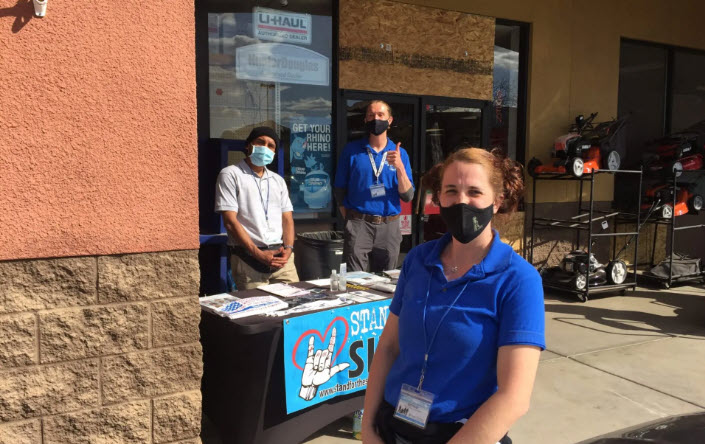 March 24, 2021
March 24, 2021
YOUNG ADVOCATES GIVING VOICE TO THE ‘SILENTS’ WHO SUFFERED BULLYING, SUICIDE

Three young people stood behind a table in front of McKay’s True Value and U-Haul, speaking to shoppers exiting the West Chandler store.
Squinting up at the plentiful spring sun, with the words “Stand for the Silent” emblazoned on their royal blue polo shirts, the visitors drew passersby into conversation—a conversation they hoped would raise awareness about bullying and child suicide.
“It hits home for me personally,” said Greg Howell, who is among the Stand for the Silent’s representatives. “I was a very individualistic, reserved kid—a little different.”
It was often difficult to deal with peers who didn’t understand him, he said. Teenage angst didn’t help.
“People are telling you it’s the end of the world,” Howell said. “It’s so hard to step outside of that and realize, you know, life’s not going to end if that girl doesn’t like you.”
Brittany Gallegos can relate, too. She also was bullied and is working for Stand for the Silent because of experiences in her formative years. She was bounced from home to home, in nine states.
“I grew up in it, like, really bad. I grew up getting bullied, went into foster care, not having stuff, parents just not being very in my life, so having nothing,” Gallegos said. “Everyone looking at me like I’m the outcast, like someone who’s just there, ‘She doesn’t have parents, she doesn’t go to father-daughter dances,’ and stuff like that.”
Gallegos has been on her own since she was 17. She put herself through college.
“My goal is to open up my own non-profit for child abuse (victims) and foster-care-neglect victims, and to be able to be a foster-care parent and guide them on the fundamentals that I’m learning here,” she said.
Alexis Araiza, who also stood at the table handing out literature, lost a soccer teammate to suicide when he was in high school.
“I just think about the ones I’ve lost,” Araiza said. “If I could have prevented their death, it would mean a lot to me.”
Araiza’s friend died by suicide after a relationship with a girlfriend fell apart. He was 17.
“We’re just trying to raise awareness,” he said.

Kirk Smalley, president and co-founder of Stand for the Silent, is not an Armani-suit-wearing, smooth talker mixing it up with Fortune-500 corporate backers. He toiling as a construction worker back in 2010, and in his online videos, he’s dressed in a T-shirt, blue jeans and baseball cap. His Oklahoma twang and plain-spoken ways hit home.
You can hear sniffles in the background of the video as the audience, rapt, takes in Smalley’s presentation.
During a phone interview with Wrangler News, he explained that his wife worked at the school their 11-year-old son, Ty, once attended.
“Ty was bullied for over two years in school and, one day, he finally had enough. He fought back,” Smalley said.
The school suspended Ty and called his mother to the office to take him home.
“When she came home that evening, she found that he had killed himself on the bedroom floor,” Smalley said.
The couple never saw it coming.
“We decided we couldn’t live in a world like that where babies were taking their own lives because of the actions of others, so we started an organization called Stand for the Silent,” Smalley said.
Pre-pandemic, he was traveling 300 days a year, visiting schools and speaking to anyone who would listen. The presentations are free to schools. Smalley says the organization survives off donations.
“In the last four years, I’ve spoken at 1,597 schools to a little over 1.6 million kids,” he said.
And though he’s addressed gatherings in Phoenix and Prescott, he’s not yet been invited to Tempe or West Chandler to share the heart-crushing story of what happened to his family—and thousands of other families whose children have died by suicide.
The fundraising teams, like the one recently outside McKay’s, raise awareness of an issue that’s becoming increasingly difficult to ignore.
“Raising awareness is more important to us actually than the funding, letting people know what’s going on in our schools and with our kids,” Smalley said.
A spate of teen suicides in the East Valley back in 2017 worried parents and school administrators.
In 2013, an eighth-grade student at Aprende Middle School died by suicide.
Erin Helm, director of communications and marketing for the Kyrene School District, emphasized the district’s commitment to student safety and well-being.
“Equity and inclusion are priorities in Kyrene, and part of building an inclusive culture is having zero tolerance for cruelty, hate or any other form of bullying,” Helm said.
The district governing board has an anti-bullying policy that lines up with the Arizona School Boards Association. The policy defines bullying, cyber-bulling, harassment and intimidation and says such behaviors “will not be tolerated.”
Kyrene schools, Helm added, “regularly reinforce this message with students through lessons and activities.”
The Anti-Defamation League named six Kyrene schools “No Place for Hate” schools last spring— more than any other district in Arizona. Cielo in Chandler plus Waggoner, Kyrene Middle School and Manitas in Tempe were among them.
